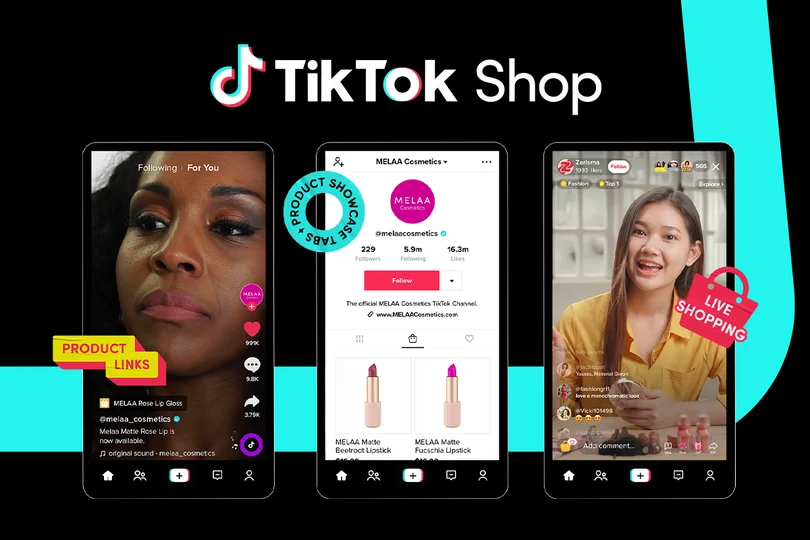Influencer marketing rose to become one of the most effective marketing strategies to connect brands with their target audiences. Despite this, some brands and influencers are exploiting the opportunity and tricking customers to make money, throwing ethics out the window.
These ethical breaches can include a lack of proper disclosure to inauthentic reviews and promotions. These tactics trick consumers into making a purchase, but that comes at the cost of long-term damage to a strong marketing channel.
Part of the success of influencer marketing is due to the general distaste for traditional marketing among consumers, especially younger ones. If influencer marketing ignores ethics and becomes too “salesy,” it could end up in the same place.
The Impact of Unethical Influencer Marketing
Both brands and influencers have been guilty of unethical marketing practices. When brands are unethical, it tends to be in the form of controlling an influencer’s voice and repurposing content without adequate permission. It may also be in discriminatory practices or low pay.
Influencers may be unethical in misrepresenting their reach and influence by purchasing fake followers. Brands still form partnerships with them, missing out on a valuable real audience. One example of this was Ritz-Carlton. Roughly 78% of the influencers’ followers were fake, wasting time and money for the campaign.[1]
Influencers may also behave unethically by failing to disclose their ads or sponsored posts properly. This is not only inappropriate, but it’s illegal according to the Federal Trade Commission guidelines.[2]
Still, some influencers may be unethical because they don’t know how to be ethical, not because they’re trying to be intentionally misleading. There’s not a lot of information available for influencer ethics.
Regardless of the specific behavior or motivation, unethical influencer marketing has a profound impact on the marketing industry as a whole. People are becoming less trustful of influencer campaigns, potentially eliminating a lucrative opportunity for both brands and creators.
When Influencer Marketing Ethics Go Wrong
Now a famous scandal, the FYRE Festival is a grand example of how bad influencer ethics can go. In Netflix’s FYRE: The Greatest Festival That Never Happened, the documentary investigates a massively hyped music festival that was promoted by prominent social media creators, which turned out to be a scam of epic proportions.
Are the influencers to blame? The brand? Both? Unfortunately, influencers don’t always have a true understanding of the nature or quality of the product they promote. And likewise, brands don’t always realize that an influencer is ignoring ethics or promoting products in a misleading manner.
Despite this, responsibility for the fraud was mostly put on the influencers who participated in the promotional campaigns. Each of these influencers showed Instagram users attractive staged posts and misled thousands of followers into thinking that the actual festival would be that extravagant.
In actuality, the festival had no organization. The team went bankrupt and failed to provide even the most basic amenities for thousands of attendees, many of whom traveled to the event because they trusted in influencer content.
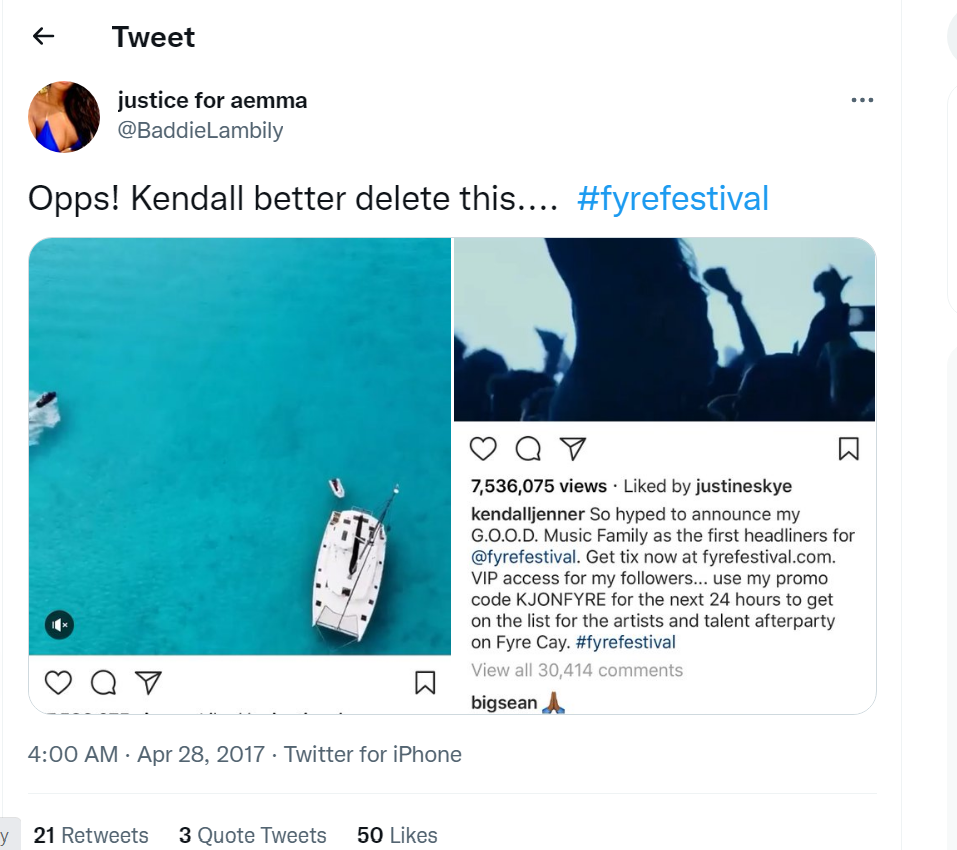
Source: Twitter
Despite numerous Instagram micro-influencers who promoted the festival, only one influencer tagged the post with #ad. Still, that proper disclosure didn’t undo the damage for the attendees who had a miserable experience.
How to Maintain Ethics in Influencer Campaigns
Ensure Every Post Has a Disclosure
One of the few bits of information about ethical influencer marketing that is available is the Federal Trade Commission’s guidelines for clear disclosures. These guidelines indicate that every ad or sponsored post must have a clear disclosure.
Unfortunately, some influencers and brands try to hide or skip the disclosure because they fear it won’t be as effective. They may bury the disclosure deep in the post or in a mix of hashtags. They may add ambiguous disclaimers that could be misinterpreted, such as #partner, #collab, #sp, etc. Not everyone will immediately know what these hashtags indicate, which is against the spirit of the disclosure requirement.
Aside from that, it’s an extremely misleading and unethical practice. Influencers for brands (or both) are trying to make content appear organic when it’s actually paid, which may have an impact on how it’s received from the audience.
Disclosures should be clearly visible, close to the message, and contained within both the audio and visual content of videos. Basically, it should be inescapably clear to the audience that it’s sponsored content. Influencers are also required to use disclaimers like #sponsored or #ad, separate from other hashtags.
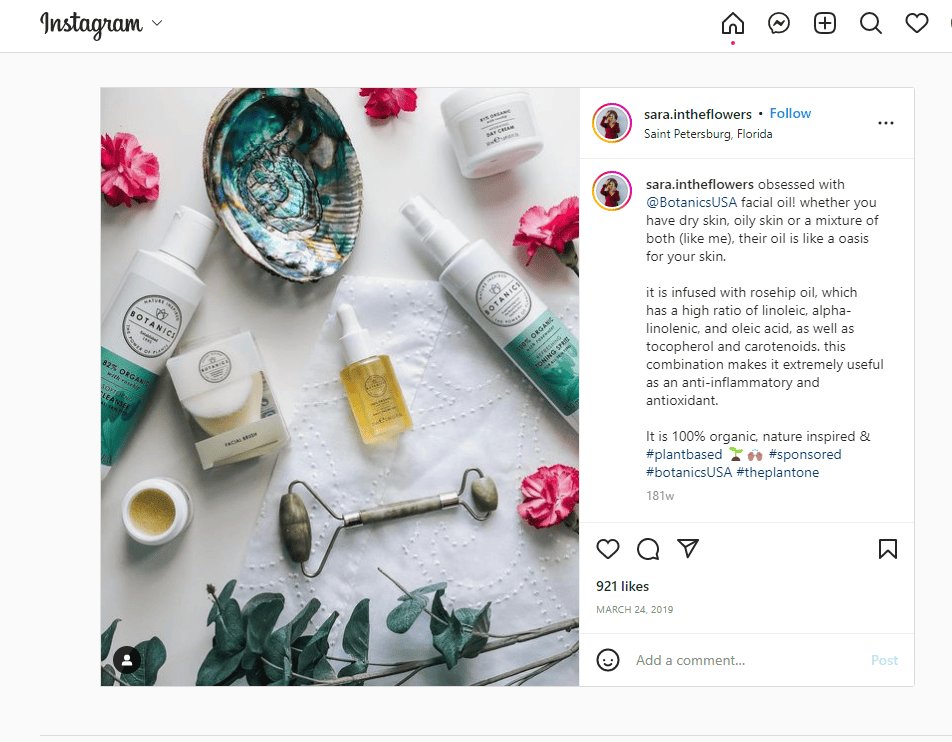
Source: Instagram
In this example, #sponsored is clearly indicated to ensure that the audience understands. It’s one of the first hashtags, followed by others, and virtually impossible to miss. Instagram also has built-in disclosure tools to make the disclaimer more obvious to the audience.
This is clear in this example of a partnership between Aimee Song and The Volon. Notice that “paid partnership with thevolon” is right below her name.
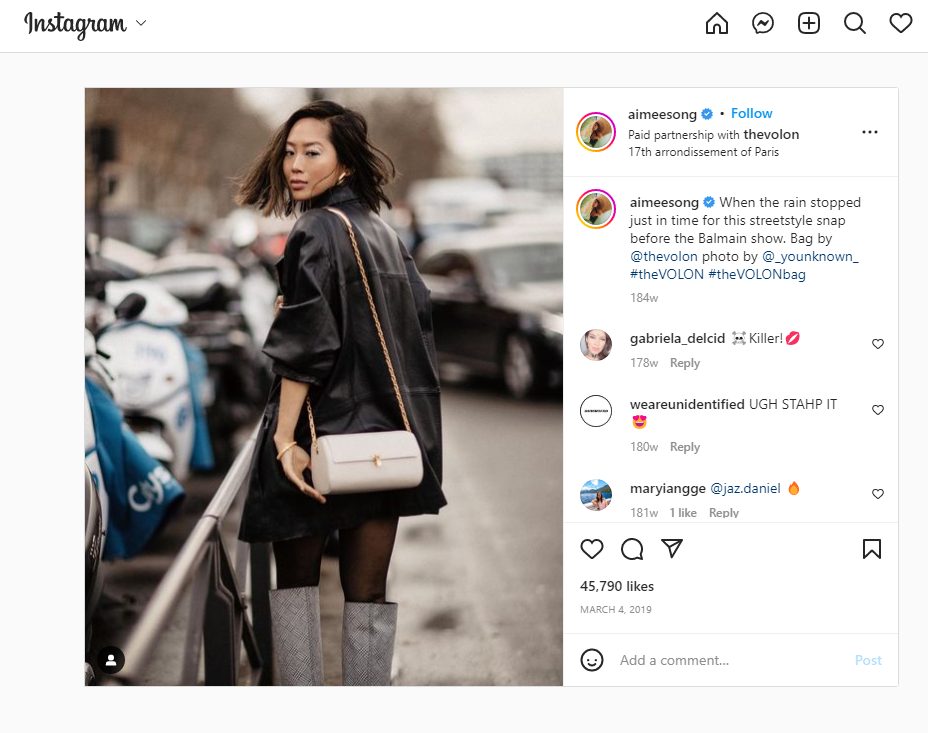
Source: Instagram
Track Influencer Content for Ethical Compliance
Brands struggle to keep track of sponsored content from an influencer, especially if there are a few in the mix. This makes it difficult to ensure that sponsored posts have clear disclaimers.
Brands should make it a point to check campaigns as much as possible, especially when working with a new influencer. Once the relationship and trust are established, it won’t be as time-consuming.
Include a Legal Disclosure Policy in the Media Kit
Brands can shore up their ethics, but that doesn’t necessarily mean that influencers will adhere to the same guidelines. The only way brands can ensure this is followed is by enforcing influencer marketing ethics through a contract.
The influencer media kit should have a legal disclosure policy and any other guidelines and requirements for campaigns. If an influencer agrees to partner, this will make them legally bound to follow the disclosure policy. Then, if the influencer doesn’t comply, the brand can take action.
Choose Authentic Influencers
Some influencers are committed to ethics. One of the best ways brands can ensure influencer marketing ethics is by choosing ethical and authentic influencers. These influencers built a name for themselves by being honest, forthright, and trustworthy, even with paid content. The audience expects this behavior from them and they have a strong reputation.
Brands should check out the posts from influencers to see which content is created for brands. If they have proper disclosure, then it’s a safe assumption that the content they create is generally compliant.
In addition, brands should see if the product reviews and promotions are biased or overly promotional. Even with a disclosure, this still comes across as inauthentic to the audience.
This is a good example of an influencer showcasing a product in an authentic way.
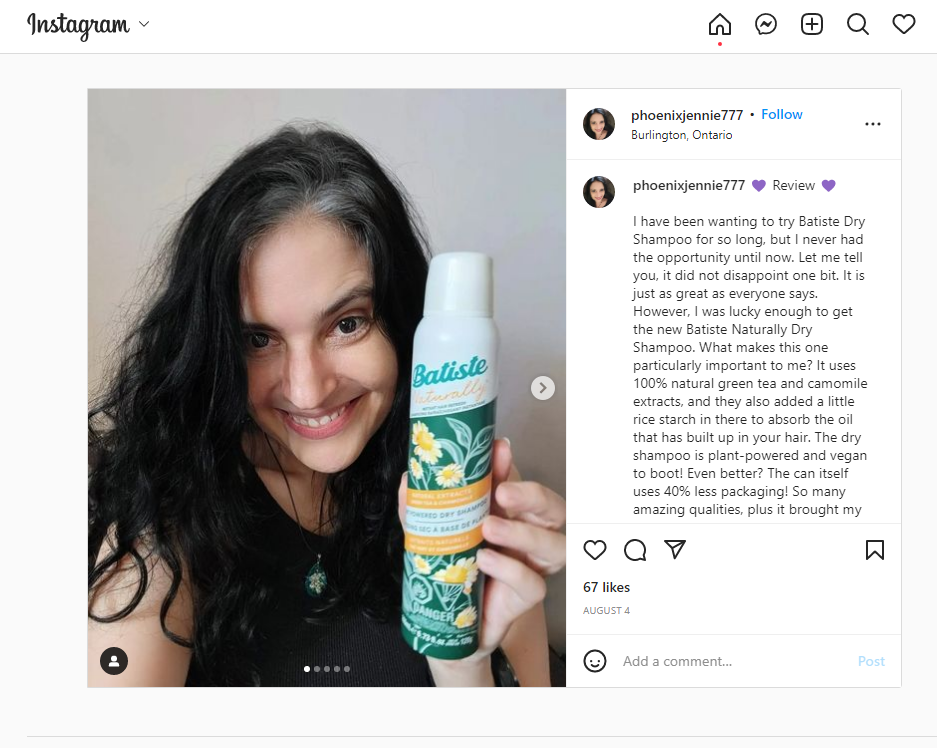
Source: Instagram
Give Influencers Freedom
One way brands can behave unethically is by trying to control everything an influencer says. For example, some brands provide influencers with pre-written captions for sponsored posts or dictate too much of the content, which makes the promotion representative of the brand and not the influencer’s opinion of the brand.
When this happens, it’s essentially just a self-made ad masquerading as an influencer’s content. It may not be truly unethical, but it’s certainly not authentic. This could cost both the brand and the influencer a potentially valuable audience, not to mention that it could harm future influencer partnerships for the brand.
Brands need to give influencers creative freedom in creating content. While it’s important for brands to have some guidelines and expectations, influencers can’t produce their best work when they’re controlled and micromanaged. They need some creative freedom and trust.
Pay Influencers Fairly
Another ethical issue that’s been growing in influencer marketing is poor pay. Influencers should be paid fairly for their time, personal brand equity, and audience. The influencer community has been increasingly open about their experiences getting “low-balled” by brands.
It’s essential for brands to be ethical about compensation for influencers. Performance metrics, such as sales, reach, traffic, engagements, and more can help brands determine what’s appropriate for a specific influencer.
Partner with Diverse Influencers
A lack of diversity and inclusivity in influencer marketing has also been gaining attention. As a result, consumers are demanding that brands make a commitment to diversity and inclusivity when partnering with influencers.
Consequences of Unethical Campaigns
If a product is advertised by an influencer without a proper disclosure, it could attract the attention of the authorities. This is more likely if the influencer and the brand – or both – are well known. Micro-influencers and small brands may get away with unethical practices, but not always.
Some believe that influencer content should be taken with “a grain of salt” as just another type of advertising. While that’s technically true, that doesn’t mean it shouldn’t be properly disclosed. When consumers watch television, they’re aware of what’s an advertisement and what’s not. Even more subtle marketing, such as product placement, is still recognized.
Worse yet, some of the promoted products could be unhealthy, harmful, or a scam, like the FYRE Festival. Influencers shouldn’t necessarily be held responsible for that, but they could be if they’re touting a product as something they actually use and not simply a paid post.
The Bottom Line on Ethical Influencer Marketing
Even without legal ramifications, unethical influencer marketing is not a good practice. Consumers care about brand ethics and hold brands to higher standards now than they once did. And aside from that, rampant deceptive advertising or misleading information among influencers and brands could create the same mistrust that made influencer marketing appealing in the first place.
Sources:
[1]https://adage.com/article/digital/study-influencer-spenders-finds-big-names-fake-followers/313223
[2]https://www.ftc.gov/business-guidance/resources/disclosures-101-social-media-influencers

